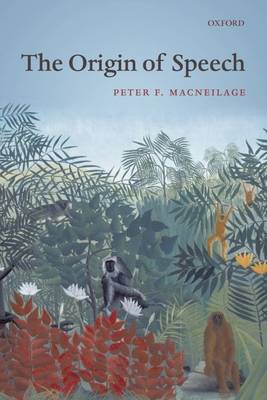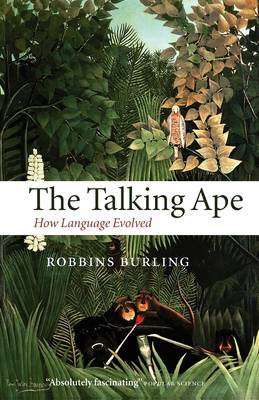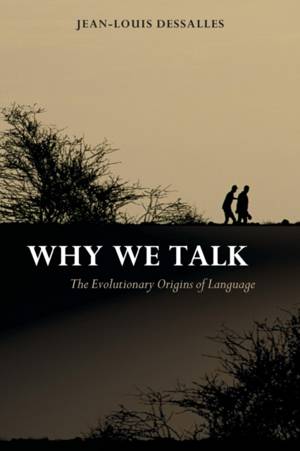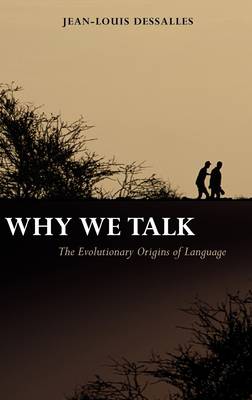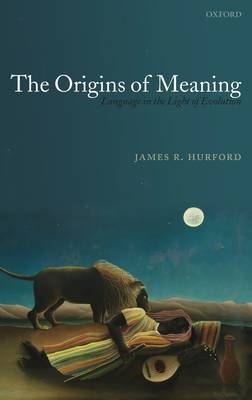
- Retrait gratuit dans votre magasin Club
- 7.000.000 titres dans notre catalogue
- Payer en toute sécurité
- Toujours un magasin près de chez vous
- Retrait gratuit dans votre magasin Club
- 7.000.0000 titres dans notre catalogue
- Payer en toute sécurité
- Toujours un magasin près de chez vous
Résultats pour "Oxford Studies in the Evolution of Language"
-
The Prehistory of Language
- Livre broché | Anglais | Oxford Studies in the Evolution of Language | n° 11
- 'When, why, and how did language evolve?' 'Why do only humans have language?' This book looks at these and other questions about the origins and evolu... Savoir plus
66,95 €Livraison 1 à 2 semaines66,95 €Livraison 1 à 2 semaines -
The Origins of Vowel Systems
Bart de Boer
- Livre relié | Anglais | Oxford Studies in the Evolution of Language | n° 1
- This book addresses tendencies of human vowel systems from the point of view of self-organization. It uses computer models to show that tendencies of ... Savoir plus
74,95 €Livraison 1 à 2 semaines74,95 €Livraison 1 à 2 semaines -
Evolutionary Syntax
Ljiljana Progovac
- Livre broché | Anglais | Oxford Studies in the Evolution of Language
- In this book, Ljiljana Progovac proposes a gradualist, adaptationist approach to the evolution of syntax, subject to natural selection. She provides a... Savoir plus
56,45 €Livraison 1 à 2 semaines56,45 €Livraison 1 à 2 semaines -
Language Origins
- Livre relié | Anglais | Oxford Studies in the Evolution of Language
- This book addresses central questions in the evolution of language: where it came from; how and why it evolved; how it came to be culturally transmitt... Savoir plus
402,95 €Livraison 2 à 3 semaines402,95 €Livraison 2 à 3 semaines -
The Origin of Speech
Peter Macneilage
- Livre broché | Anglais | Oxford Studies in the Evolution of Language
- This book explores the origin and evolution of speech. The human speech system is in a league of its own in the animal kingdom and its possession dwar... Savoir plus
61,45 €Livraison 1 à 2 semaines61,45 €Livraison 1 à 2 semaines -
The Talking Ape
Robbins Burling
- Livre broché | Anglais | Oxford Studies in the Evolution of Language
- Humans never run out of things to say. We explain, we cajole, we gossip, and we flirt--all with the help of language. But how in the space of several ... Savoir plus
35,45 €Livraison 2 à 3 semaines35,45 €Livraison 2 à 3 semaines -
The Nature and Origin of Language
Denis Bouchard
- Livre relié | Anglais | Oxford Studies in the Evolution of Language | n° 18
- This book looks at how the human brain got the capacity for language and how language then evolved. Its four parts are concerned with different views ... Savoir plus
175,95 €Livraison 1 à 2 semaines175,95 €Livraison 1 à 2 semaines -
The Origins of Vowel Systems. Studies in Teh Evolution of Language
Bart de Boer, B De Boer
- Livre broché | Anglais | Oxford Studies in the Evolution of Language | n° 1
- This book addresses tendencies of human vowel systems from the point of view of self-organization. It uses computer models to show that tendencies of ... Savoir plus
74,45 €Livraison 2 à 3 semaines74,45 €Livraison 2 à 3 semaines -
Why We Talk
Jean-Louis Dessalles
- Livre broché | Anglais | Oxford Studies in the Evolution of Language
- Constant exchange of information is integral to our societies. Jean-Louis Dessalles explores how this came into being. He develops a view of language ... Savoir plus
53,45 €Livraison 1 à 2 semaines53,45 €Livraison 1 à 2 semaines -
Social Origins of Language Sel
Knight Lewis Eds Dor
- Livre broché | Anglais | Oxford Studies in the Evolution of Language | n° 19
- This book offers an exciting new perspective on the origins of language. Language is conceptualized as a collective invention, on the model of writing... Savoir plus
116,45 €Livraison 2 à 3 semaines116,45 €Livraison 2 à 3 semaines -
The Transition to Language
- Livre broché | Anglais | Oxford Studies in the Evolution of Language
- Linguists, biological anthropologists, and cognitive scientists come together in this book to explore the origins and early evolution of phonology, sy... Savoir plus
72,95 €Livraison 1 à 2 semaines72,95 €Livraison 1 à 2 semaines -
The Nature and Origin of Language
Denis Bouchard
- Livre broché | Anglais | Oxford Studies in the Evolution of Language | n° 18
- This book looks at how the human brain got the capacity for language and how language then evolved. Its four parts are concerned with different views ... Savoir plus
66,95 €Livraison 1 à 2 semaines66,95 €Livraison 1 à 2 semaines -
Evolutionary Emergence of Language
- Livre relié | Anglais | Oxford Studies in the Evolution of Language | n° 17
- The book presents new and stimulating approaches to the study of language evolution and considers their implications for future research. Leading scho... Savoir plus
290,45 €Livraison 2 à 3 semaines290,45 €Livraison 2 à 3 semaines -
The Transition to Language
- Livre relié | Anglais | Oxford Studies in the Evolution of Language
- Linguists, biological anthropologists, and cognitive scientists come together in this book to explore the origins and early evolution of phonology, sy... Savoir plus
85,95 €Livraison 1 à 2 semaines85,95 €Livraison 1 à 2 semaines -
The Prehistory of Language
- Livre relié | Anglais | Oxford Studies in the Evolution of Language | n° 11
- 'When, why, and how did language evolve?' 'Why do only humans have language?' This book looks at these and other questions about the origins and evolu... Savoir plus
338,45 €Livraison 2 à 3 semaines338,45 €Livraison 2 à 3 semaines -
Why We Talk
Jean-Louis Dessalles
- Livre relié | Anglais | Oxford Studies in the Evolution of Language | n° 5
- Constant exchange of information is integral to our societies. Jean-Louis Dessalles explores how this came into being. He develops a view of language ... Savoir plus
100,45 €Livraison 1 à 2 semaines100,45 €Livraison 1 à 2 semaines -
Language Origins
- Livre broché | Anglais | Oxford Studies in the Evolution of Language
- This book addresses central questions in the evolution of language: where it came from; how and why it evolved; how it came to be culturally transmitt... Savoir plus
54,45 €Livraison 1 à 2 semaines54,45 €Livraison 1 à 2 semaines -
Language Evolution
- Livre relié | Anglais | Oxford Studies in the Evolution of Language
- The leading scholars in the rapidly growing field of language evolution give readable accounts of their theories on the origins of language and reflec... Savoir plus
377,95 €Livraison 1 à 2 semaines377,95 €Livraison 1 à 2 semaines -
Evolutionary Syntax
Ljiljana Progovac
- Livre relié | Anglais | Oxford Studies in the Evolution of Language
- In this book, Ljiljana Progovac proposes a gradualist, adaptationist approach to the evolution of syntax, subject to natural selection. She provides a... Savoir plus
148,95 €Livraison 1 à 2 semaines148,95 €Livraison 1 à 2 semaines -
Self-Organization in the Evolution of Speech
Pierre-Yves Oudeyer
- Livre broché | Anglais | Oxford Studies in the Evolution of Language | n° 6
- Oudeyer combines insights from neuroscience, evolutionary biology, and linguistics to explore questions about the origins of speech. He puts forward t... Savoir plus
83,95 €Livraison 2 à 3 semaines83,95 €Livraison 2 à 3 semaines -
Language Evolution
- Livre broché | Anglais | Oxford Studies in the Evolution of Language
- The leading scholars in the rapidly growing field of language evolution give readable accounts of their theories on the origins of language and reflec... Savoir plus
112,95 €Livraison 2 à 3 semaines112,95 €Livraison 2 à 3 semaines -
The Origins of Meaning
James R Hurford
- Livre relié | Anglais | Oxford Studies in the Evolution of Language | n° 8
- In this, the first of two ground-breaking volumes on the nature of language in the light of the way it evolved, James Hurford looks at how the world f... Savoir plus
132,45 €Livraison 2 à 3 semaines132,45 €Livraison 2 à 3 semaines -
Evolution of Morphology
Andrew Carstairs-McCarthy
- Livre broché | Anglais | Oxford Studies in the Evolution of Language
- This book considers the evolution of the grammatical structure of words in the more general contexts of human evolution and the origins of language. T... Savoir plus
104,95 €Livraison 2 à 3 semaines104,95 €Livraison 2 à 3 semaines -
The Cradle of Language
- Livre relié | Anglais | Oxford Studies in the Evolution of Language | n° 12
- This book is the first to focus on the African origins of human language. It explores the origins of language and culture 250,000-150,000 years ago wh... Savoir plus
251,95 €Livraison 1 à 2 semaines251,95 €Livraison 1 à 2 semaines









